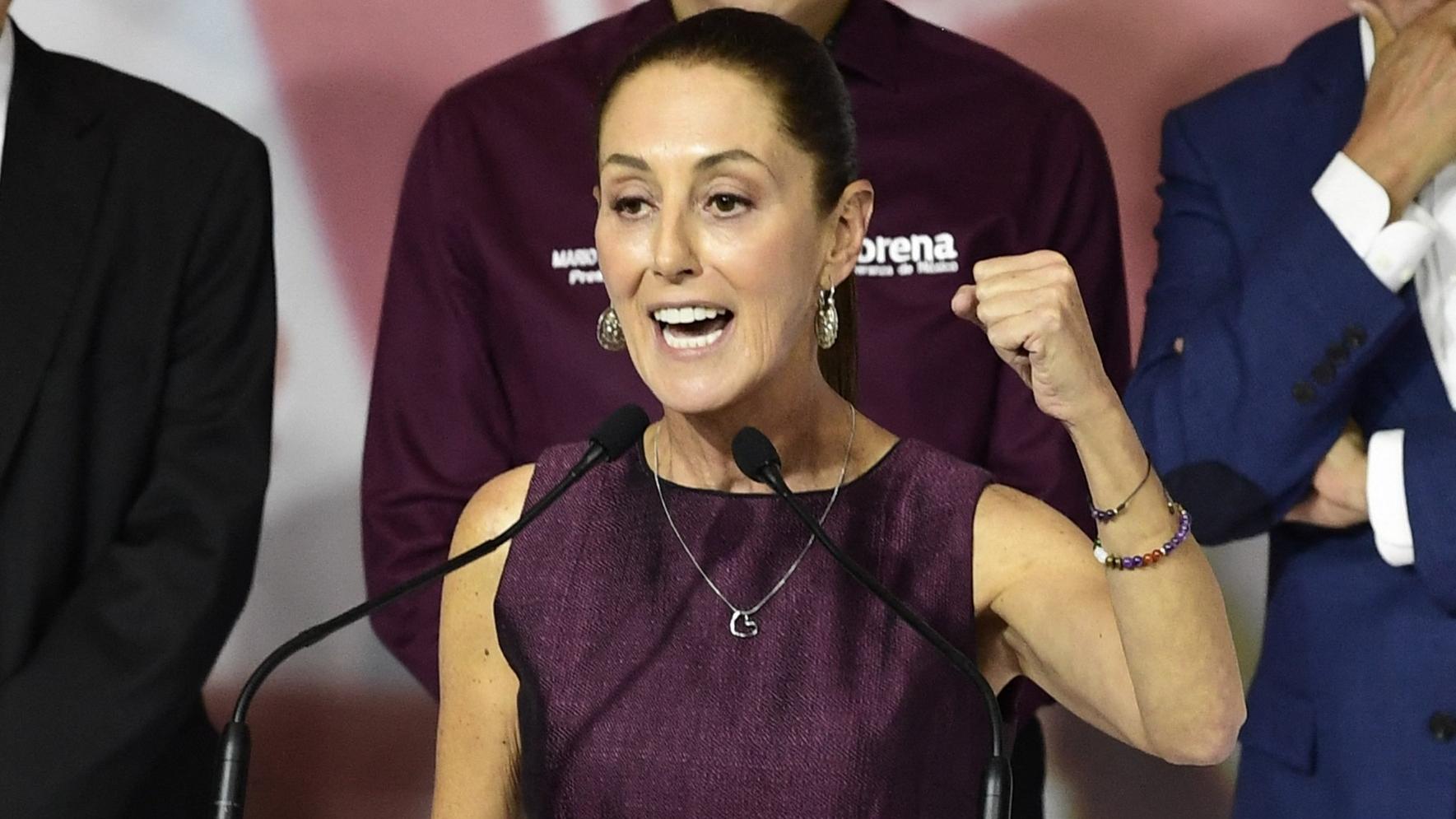 Former Mexico City mayor Claudia Sheinbaum speaks after being named presidential candidate of the ruling Morena party for next year's presidential election in Mexico City on Sept 6, 2023. (PHOTO / AFP)
Former Mexico City mayor Claudia Sheinbaum speaks after being named presidential candidate of the ruling Morena party for next year's presidential election in Mexico City on Sept 6, 2023. (PHOTO / AFP)
MEXICO CITY — In a grainy 1991 black and white photograph, Claudia Sheinbaum - the favorite to be Mexico's next president - holds aloft a banner reading 'Fair Trade and Democracy Now!!' in protest against the Mexican government of the day.
Sheinbaum and her mentor, President Andres Manuel Lopez Obrador, a trenchant critic of the establishment before he took power, would not meet until years later.
If Sheinbaum or her opposition rival, businesswoman-turned-politician Xochitl Galvez, wins the June 2, 2024 election, one of them will become the country's first female president
But the photo - posted by her on social media in June - underscores their shared zeal for curbing chronic inequality in Mexico and the belief that powerful elites perpetuate it.
READ MORE: Mexico City mayor to step down for historic bid for presidency
Now, Sheinbaum, 61, wants to assume his mantle as a defender of the state, cementing public control of natural resources, and strengthening his welfare programs and flagship infrastructure projects. She is also set to push Mexico towards more renewable energy usage.
"There's no turning back from the transformation begun by President Andres Manuel Lopez Obrador," Sheinbaum shouted to a crowd of supporters late last month in central Mexico City during her campaign for the presidential nomination of the governing leftist National Regeneration Movement (MORENA).
On Wednesday, MORENA said Sheinbaum, who in June stood down as Mexico City mayor to pursue the nomination, would be its candidate to succeed Lopez Obrador.
Her victory was not without controversy, with her main rival, former foreign minister Marcelo Ebrard, denouncing the selection process as marred by irregularities.
Under Mexican law, presidents can only serve a single six-year term.
If Sheinbaum or her opposition rival, businesswoman-turned-politician Xochitl Galvez, wins the June 2, 2024 election, one of them will become the country's first female president.
Sheinbaum has been scrupulously loyal to Lopez Obrador, even as he struggled to tame record levels of violence, picked fights with energy investors, pilloried critical media and alienated many wealthier Mexicans.
On security, she has outshone him, reducing murders in Mexico City by nearly half during her tenure as mayor. Sheinbaum also expanded public transport and pushed greener energy policies.
A punctilious former ballet student of Jewish descent whose student activism evolved into a distinguished career as a physicist and environmentalist, Sheinbaum is said by aides to be as analytical as the 69-year-old Lopez Obrador is political.
Lopez Obrador regularly lambasts adversaries at daily news briefings. Sheinbaum, by contrast, has pursued a more measured, scientific governing style, extolling cooperation.
"As a physicist I say this: It's easy to create chaos and pretty hard to bring about order, especially when you have a social vision," she told Reuters last year.
The president's approval rating has consistently held around 60 percent, making him crucial to MORENA's hopes of victory.
But as the presidential campaign gathers pace, Sheinbaum will have to strike a balance between loyalty to Lopez Obrador and offering new ideas, said political consultant Antonio Ocaranza, a former spokesman for ex-President Ernesto Zedillo.
Social justice
The photo Sheinbaum shared on X, formerly Twitter, showed her at the center of a protest against a 1991 visit to Stanford University by then-President Carlos Salinas, a champion of economic liberalism who has been long vilified by Mexico's left.
Soon after he became president, aides and political insiders began mentioning her as his political heir, seeing her as the most apt defender of Lopez Obrador's drive to make the state the engine of social change and custodian of the economy
"A few years have gone by, but I still have the same feeling and yearning for social justice," she wrote alongside it.
Salinas oversaw major privatizations after a highly controversial 1988 election, and Lopez Obrador has long depicted the policies as the cause of modern inequality in Mexico.
A few weeks after Sheinbaum's photo was taken, Lopez Obrador launched a weeks-long protest march dubbed the "Exodus for Democracy", claiming Salinas' Institutional Revolutionary Party (PRI) had rigged elections in his native Tabasco state.
The march to Mexico City helped propel Lopez Obrador to national prominence - and, later, to his first meeting with Sheinbaum after he was elected mayor of the capital in 2000.
Lopez Obrador appointed Sheinbaum city environment minister, and she became a close ally. In 2018, she was elected mayor as part of the team that swept him to power.
Soon after he became president, aides and political insiders began mentioning her as his political heir, seeing her as the most apt defender of Lopez Obrador's drive to make the state the engine of social change and custodian of the economy.
READ MORE: Mexico's president, judiciary in standoff over pay
If elected, she would be just as nationalistic about the economy as Lopez Obrador, said Rene Cervera, a Sheinbaum aide who once worked for Ebrard, her MORENA rival.
Though while Lopez Obrador has pumped billions of dollars into state oil company Pemex, Sheinbaum, who was part of the Intergovernmental Panel on Climate Change which shared the 2007 Nobel Peace Prize, wants to tap Mexico's renewable power.
"With public investment," said Cervera.


